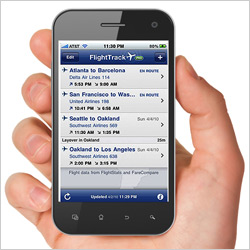M ore Millennials report using
travel apps on their smartphones including Hotels.com, Expedia, Kayak and traditional carriers like Delta and American Airlines, according to a new study by the Boston Consulting Group.
ore Millennials report using
travel apps on their smartphones including Hotels.com, Expedia, Kayak and traditional carriers like Delta and American Airlines, according to a new study by the Boston Consulting Group.
Millennials use travel apps on their smartphones more often than non-Millennials and rely more on user reviews, experiences, and online content when booking travel.
The finding is just one
piece of data from the research that focused on the travel preferences and spending habits of Millennials.
This group will be the core customers of travel companies in the next five to 10
years, and companies must develop an effective strategy for branding and marketing, loyalty programs, distribution channels, and amenities in order to meet their needs and preferences, according to
the Boston-based marketing research company.
advertisement
advertisement
Their spending on business flights is projected to reach nearly 50% of the total by 2020, and their leisure-travel activity will have a major
impact on the travel and tourism industry, according to the report, Traveling with Millennials, which is based on a survey of 4,000 Millennials (ages 16-34) and 1,000 non-Millennials (35-74) in the U.S. and has implications for
companies marketing to both business and leisure travelers.
Other key findings include that Millennial business travelers are 60% more likely to upgrade for extra legroom and are far more
likely to pay for in-flight entertainment. Millennials report paying on average 13% more per airline ticket than the average non-Millennial flyer. And Millennials are more likely than non-Millennials
to travel for leisure in organized groups.
Forward-looking travel and tourism companies can earn the business and loyalty of Millennials (16- to-34-year-olds) by acting now to understand and
address their unique preferences and needs.
“In as few as five years, Millennials will enter their peak earning, spending, and traveling years and surpass the baby boomers in
business flight spending,” said Christine Barton, a BCG partner and lead author of the report, in a release. “The window of opportunity for businesses to understand the unique travel
approach of this generation and gain its mind share is closing rapidly. Companies will be more successful if they determine an effective Millennial strategy now.”
Companies must address
a full spectrum of considerations along a continuum of time, effort, and risk when developing a strategy for meeting Millennials’ needs.
At one end of the spectrum are near-term
marketing, branding, and communication tactics that will begin to engage Millennials, shaping their perceptions and preferences.
Companies must also develop bespoke distribution strategies and
tactics and in the longer term, consider more capital-intensive projects that align with Millennials’ habits and preferences.
Modified "Hand Holding Smartphone" photo from Shutterstock.